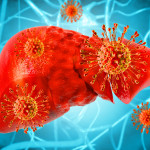Nearly one out of every three people in the world, about 2 billion people, have been infected with the hepatitis B virus (HBV), and one in 12—more than 520 million people—live with chronic HBV or chronic hepatitis C virus (HCV) infection, according to a report released by the World Health Organization (WHO) ahead of World Hepatitis Day, which is observed July 28.
About 1 million deaths per year are attributed to viral hepatitis infections, the WHO reports. Together, HBV and HCV are the leading cause of liver cancer in the world, accounting for 78 percent of cases.
Most people who have contracted these viruses are unaware of their infection, the report adds. Early diagnosis remains a major goal of the WHO, as it provides the best opportunity for successful medical treatment. It also allows people living with hepatitis to take steps to prevent transmitting the disease to others; for example they can practice safe sex. It also allows them to make lifestyle changes that can help protect their livers from additional harm; specifically, they can eliminate alcohol and certain drugs that are toxic to the liver.
The WHO report notes that all the hepatitis viruses—hepatitis A virus (HAV), hepatitis D virus (HDV) and hepatitis E virus (HEV), as well as HBV and HCV—can be prevented and treated. Safe and effective vaccines are widely available for HAV and HBV. Screening blood used for transfusions—along with using sterile injection equipment, safer sex and harm reduction practices—can prevent transmission of HBV and HCV. As for preventing HAV and HEV, safe food and water are considered to be the best protectors.
The chronic viral hepatitis infections can also be treated.
Treatment of HBV infection has been shown to reduce the risk of liver cancer and death. It is estimated that 20 to 30 percent of people with HBV could benefit from treatment. “However,” the report notes, “drugs active against HBV are not widely available or utilized in persons infected with HBV.”
HCV is generally considered to be a curable disease, but for many people this is not a reality, the report says. Scientific advances and intense research and development have led to the development of many new oral antiviral drugs for HCV infection. A great number of HCV-specific oral drugs are in the late stage of development; some have been recently registered. These are more effective and better tolerated. Yes, the report argues, “much still needs to be done to ensure that these new treatment advances lead to greater access and treatment responses in resource-constrained areas of the world.”
At its 2010 meeting, the World Health Assembly resolved that July 28 should be designated as World Hepatitis Day. World Hepatitis Day is set aside to provide an opportunity for education and greater understanding of viral hepatitis as a global public health problem, and as an opportunity for nations around the world to stimulate and strengthen their measures to prevent and control this disease.
Advertisement
Advertisement
Advertisement





2 Comments
2 Comments